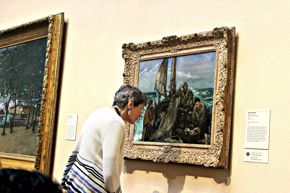Looking Together July 25, 2014
A year ago, as I was interviewing for my position here at the MFAH, one of the biggest incentives for me was that I would get to oversee the Museum’s wonderful and growing programs for visitors with disabilities.
The Museum offers two specialized tours: “Art Beyond Sight,” which serves the blind and visually impaired; and “Looking Together,” which serves adults diagnosed with Alzheimer’s disease and other dementias, along with their extended circles of support. I thoroughly enjoy working with this constituency and the amazing MFAH docents who facilitate these tours.
“Looking Together” was launched six years ago at the request of one of our devoted participants and friends, Dr. Richard Taylor. This program was Richard’s response to his own diagnosis, which helped him see firsthand the significance of a program that would allow a rich gallery experience that otherwise might not be possible in a crowded museum. He is not alone, as the number of Americans receiving such a diagnosis is growing: 5 million people age 65 or older in the United States have Alzheimer’s.
This program drives home the idea that art is an incredible agent for rich conversations about life, bringing folks together around it to create community. I have experienced this in my year at the Museum, watching the participants’ eyes light up as they connect with the art, their families, and one another. A community has emerged in our Museum space that otherwise might not have. This accomplishment pushes our team forward as we think about the growth of “Looking Together.”
An essential part of our team is the Houston chapter of the Alzheimer’s Association. This group has been a fundamental partner for trainings, studies, reflection, and feedback. Our docents also get to train with other prestigious museums such as MoMA, the Met, and the Guggenheim, which offer similar programs.
We are excited about the work that is coming out of “Looking Together,” and we invite you to join us on selected Mondays if this program sounds right for you and a loved one. Contact us at accessibility@mfah.org for information.
Want to read more about how the Museum seeks to increase access for all visitors? See our list of programs and services.






